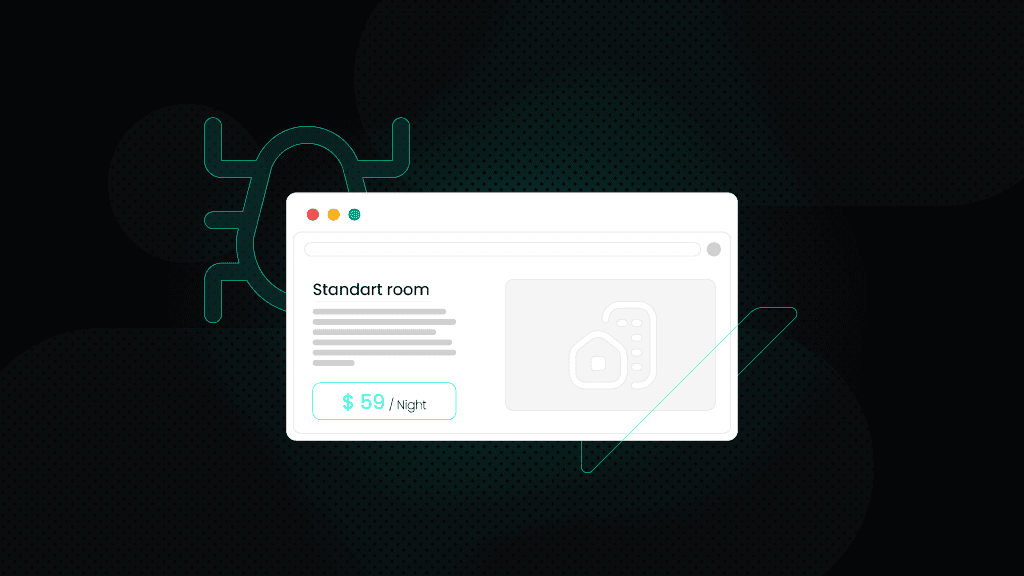How to Scrape Hotel Listings: Unlocking the Secrets
Scraping hotel listings is a powerful tool for gathering comprehensive data on accommodations, prices, and availability from various online sources. Whether you're looking to compare rates, analyze market trends, or create a personalized travel plan, scraping allows you to efficiently compile the information you need. In this article, we'll explain how to scrape hotel listings, ensuring you can leverage this data to its fullest potential.
Proven methods for scraping hotel listings
To scrape hotel listings effectively, follow these steps:
- Identify your data needs. Determine what information you want to extract, such as hotel names, ratings, prices, amenities, and locations. This will guide you through your scraping process.
- Set up your web scraping tool. Choose a tool like BeautifulSoup, Scrapy, Selenium, or Puppeteer. Install the necessary libraries and configure the tool to meet your requirements.
- Run and monitor your web scraping process. Define the URLs of hotel listings, set parameters, and launch the scraping process. Regularly check for errors and make adjustments as needed.
Following these steps ensures a smooth and efficient web scraping process, allowing you to gather and analyze hotel listing data effectively.
Importance of web scraping in the hotel industry
Access to up-to-date and accurate data is vital in the highly competitive hotel industry. Web scraping enables hotel managers to:
- Monitor competitor prices
- Track market trends
- Identify opportunities for revenue optimization
Moreover, web scraping in the hotel industry goes beyond just pricing and availability data. It can also be used to gather customer reviews and feedback from various platforms, giving hotel owners valuable insights into customer preferences and satisfaction levels. For travelers, web scraping provides a wealth of information for making informed decisions and finding the best deals.
By analyzing scraped data, hotels can:
- Improve their services
- Tailor their offerings to meet customer needs
- Enhance the overall guest experience
Additionally, web scraping lets hotels stay updated on industry news, events, and developments. By monitoring relevant websites and news sources, hoteliers can stay ahead of the curve, adapt to changing market conditions, and make informed decisions to remain competitive in the dynamic hospitality landscape.
Tools and technologies for scraping hotel listings
When it comes to scraping hotel listings, you have numerous tools and technologies at your disposal. Let's explore these options and discover how to choose the right technology for your needs.
Web scraping has become an essential tool for extracting data from websites efficiently. It allows you to gather information from multiple sources and analyze it for various purposes, such as:
- Market research
- Price comparison
- Trend analysis
With the right tools and technologies, you can automate the process of collecting hotel listings, saving time and effort.
Overview of web scraping tools
Web scraping tools come in different shapes and sizes, ranging from simple browser extensions to powerful libraries and frameworks. Some of the most popular options include:
- BeautifulSoup
- Scrapy
- Selenium
- Puppeteer
These tools provide developers with a wide array of features, making the process of scraping hotel listings more efficient and effective.
BeautifulSoup, for example, is a Python library that's great for parsing HTML and XML documents. It simplifies the process of extracting data from web pages by providing easy-to-use methods and functions.
On the other hand, Scrapy is a more advanced web crawling and scraping framework that offers scalability and extensibility for larger projects.
Selenium and Puppeteer are tools commonly used for browser automation, allowing you to interact with web pages dynamically.
Choosing the right technology for your needs
Before diving into web scraping, you must assess your requirements and determine which technology best suits your needs. Factors to consider include:
- Complexity of the websites you want to scrape
- Desired level of automation
- Your programming skills
By selecting the right technology, you can streamline the scraping process and achieve optimal results.
It's important to note that web scraping should be done in compliance with the website's terms of service. Make sure to respect the website's robots.txt file and avoid overloading their servers with too many requests.
By using web scraping responsibly, you can harness the power of data extraction for your projects while maintaining good relationships with website owners.
Cleaning and analyzing scraped data
After successfully scraping hotel listings, you'll have a vast amount of raw data at your disposal. However, this data may require cleaning and analysis to be truly useful. Let's explore techniques for data cleaning and how to analyze and interpret your scraped data effectively.
Techniques for data cleaning
Data cleaning is an essential step in any data analysis project. It involves:
- Removing duplicate entries
- Handling missing values
- Correcting any inconsistencies or errors in the data.
Various techniques, such as filtering, imputation, and outlier detection, can be used to clean and preprocess scraped data, ensuring its accuracy and reliability.
Filtering is a powerful technique that allows you to remove unwanted data from your scraped hotel listings. By setting specific criteria, you can exclude irrelevant or erroneous entries, ensuring that your analysis is based on high-quality data.
Imputation, on the other hand, is a method used to fill in missing values in your dataset. This technique helps to maintain the integrity of your analysis by providing estimates for missing data points based on the available information.
Outlier detection is the final important aspect of data cleaning. Outliers are data points that deviate significantly from the rest of the dataset and can skew your analysis. By identifying and handling outliers appropriately, you can ensure that your analysis isn't influenced by these extreme values, leading to more accurate and reliable insights.
Analyzing and interpreting your data
Once your data is cleaned, it's time to analyze and interpret it to extract meaningful insights. Utilize statistical analysis, data visualization, and machine learning algorithms to uncover insights, such as:
- Patterns
- Trends
- Correlations within the scraped hotel listings data.
These insights will empower you to make informed decisions and gain a competitive edge in the hotel industry.
Statistical analysis allows you to quantify and summarize the characteristics of your data. By calculating measures such as mean, median, and standard deviation, you can better understand the central tendencies and variabilities within your dataset.
Data visualization, on the other hand, provides a visual representation of your data, making it easier to identify patterns and trends. Bar charts, scatter plots, and heatmaps are just a few examples of the powerful visualization tools at your disposal.
Start scraping hotel listings today
Web scraping is an invaluable tool for scraping hotel listings, providing hoteliers and travelers with access to a wealth of data.
By understanding the basics of web scraping and choosing the right technology, you can leverage this powerful technique to streamline your hotel search and gain a competitive advantage. So why wait? Start scraping hotel listings today and discover the perfect accommodation for your next trip!
About the author

Vilius Sakutis
Head of Partnerships
With an eagerness to create beneficial partnerships that drive business growth, Vilius brings valuable expertise and collaborative spirit to the table. His skill set is a valuable asset for those seeking to uncover new possibilities and learn more about the proxy market.
All information on Smartproxy Blog is provided on an "as is" basis and for informational purposes only. We make no representation and disclaim all liability with respect to your use of any information contained on Smartproxy Blog or any third-party websites that may be linked therein.



